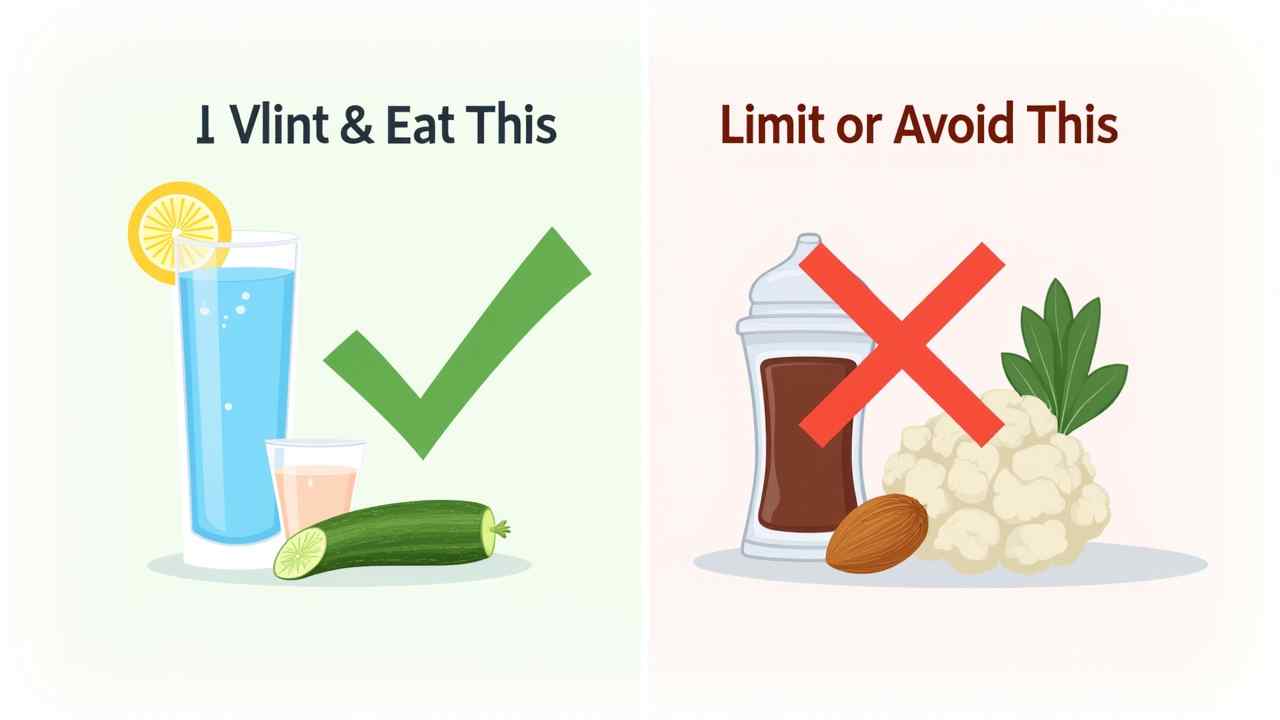
🩺 A Diet to Prevent Renal Calculi (Kidney Stones): A Doctor's Guide
🩺 A Diet Guide to Prevent Renal Calculi (Kidney Stones) 🩺
❗ CRITICAL MEDICAL INFORMATION: If you have had a kidney stone (renal calculus), you must work with a doctor or a urologist. The specific dietary advice you need depends on the exact type of stone you form. This guide provides general, evidence-based principles and is not a substitute for a personalized medical plan.
Experiencing a kidney stone is an incredibly painful event that most people never want to repeat. The good news is that for many, the risk of forming another stone can be dramatically reduced through diet. A smart diet to prevent renal calculi is your most powerful tool for prevention.
This guide will explain the most important dietary strategies. We will focus on the most common type of stone, calcium oxalate. Let's explore how you can take control of your kidney health. ✅
🤔 What is the Single Most Important Rule for All Stone Formers?
Regardless of the type of stone you have, the number one, non-negotiable rule is to drink more water. Your primary goal is to keep your urine diluted. Think of it like this: crystals cannot form easily in a flowing river, but they can in a stagnant pond.
You should aim to drink enough fluid to produce at least 2.5 liters of urine per day. For most people, this means drinking about 3 liters of fluid. The best indicator is the color of your urine. It should be a very pale, light yellow. Water ("su" in Turkish) is the best choice. Adding fresh lemon juice can also be beneficial, as the citrate in lemon helps to inhibit stone formation.
- How to Prevent Calcium Oxalate Stones (The Most Common Type)
Most kidney stones are made of calcium oxalate. If your doctor has confirmed this is your stone type, a specific diet to prevent renal calculi is very effective. It focuses on three key areas.
1. Should You Reduce Oxalate Intake?
Yes, but you need to be smart about it. You do not need to eliminate all oxalate. The goal is to strictly limit the foods that are exceptionally high in oxalates. The biggest offenders are:
- Spinach
- Rhubarb
- Almonds and cashews
- Beets
- Potatoes (especially sweet potatoes)
By avoiding these few super-high-oxalate foods, you can significantly reduce your oxalate load.
2. Should You Avoid Calcium? (A Common Myth)
No! This is a dangerous myth. You need to eat a normal amount of calcium. The key is to eat calcium-rich foods with your meals. When you do this, the calcium binds to the oxalate in your stomach and intestines. This allows the oxalate to be eliminated in your stool, instead of in your urine where it can form stones.
Good sources of dietary calcium include milk, cheese, and yogurt. A simple bowl of Turkish yogurt ("yoğurt") with your meal is a fantastic strategy.
3. Why Must You Reduce Your Sodium Intake?
This is a crucial step. A high-sodium diet causes your kidneys to excrete more calcium into your urine. The more calcium in your urine, the higher your risk of forming a calcium oxalate stone. The best way to reduce sodium is to avoid processed foods, canned soups, and restaurant meals. Focus on cooking fresh, whole foods at home.
- What About Uric Acid Stones?
Uric acid stones are less common. The dietary advice is different. In this case, the main goal is to limit foods that are high in purines. These include red meat, organ meats (like liver), and certain types of seafood like sardines. Reducing animal protein overall is often recommended.
No matter your stone type, a healthy diet is a key to prevention. The cooler autumn season is a great time to start cooking these healthy, comforting meals at home. Work with your doctor to create the perfect plan for you. 💧